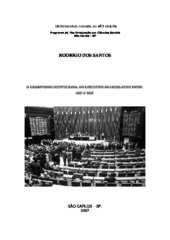| dc.contributor.author | Santos, Rodrigo dos | |
| dc.date.accessioned | 2016-06-02T19:25:25Z | |
| dc.date.available | 2008-03-14 | |
| dc.date.available | 2016-06-02T19:25:25Z | |
| dc.date.issued | 2007-12-18 | |
| dc.identifier.citation | SANTOS, Rodrigo dos. O desempenho institucional do Executivo no Legislativo entre 2002 e 2006. 2007. 118 f. Dissertação (Mestrado em Ciências Humanas) - Universidade Federal de São Carlos, São Carlos, 2007. | por |
| dc.identifier.uri | https://repositorio.ufscar.br/handle/ufscar/1465 | |
| dc.description.abstract | This master thesis analyses the interplay of political powers in Brazilian
Legislative chambers, during Lula s government. It considers the point of view of the
parties and the interests present on budget and fiscal disputes between Federal
Executive power and State Executive powers. It is considered that, as a representative
and supervisory institute, the Legislative chambers offer the possibility of politic
interactions between Executive power, governors and parties. The analysis follows eight
budget initiatives, being four of Crédito Extraordinário (Extraordinary Credit) and four
of Auxílio Financeiro (Financial Aid), made through Medidas Provisórias (Provisory
Measures) by the Executive power in benefit of States, towns and cities, after some
partial constitutional modifications, known as the Amendment n° 32, were
implemented.
After the identification of the gaps existing both in studies that stress the
centralization of legislative works and studies that emphasize the individual and
regional members of parliament s behavior, this study stresses the need for initiatives of
the Executive power that consider the tributary increase of other government instances.
It is argued that the Executive can, strategically, co-ordinate his initiatives with the
other government instances in an interactive way, to strengthen the Federal Government
and to promote modifications in the current model of fiscal exaction. The analysis of the
data shows that the Executive power, in spite of assuming the need for a reformulation
of the fiscal model, avoids the influence of the Legislative power, particularly that of the
Senate, driving bigger resources for Crédito Extraordinário, in detriment of Auxílio
Financeiro. It concludes that the difficulties found by the Executive power to approve a
new model of fiscal exaction in the Legislative chambers can be associated with little
influence of the government party (PT) on state governments. | eng |
| dc.format | application/pdf | por |
| dc.language | por | por |
| dc.publisher | Universidade Federal de São Carlos | por |
| dc.rights | Acesso Aberto | por |
| dc.subject | Ciência política | por |
| dc.subject | Poder executivo | por |
| dc.subject | Poder legislativo | por |
| dc.subject | Governadores | por |
| dc.subject | Federalismo fiscal | por |
| dc.subject | Executive, Legislative | eng |
| dc.subject | Governors | eng |
| dc.subject | Decision centralization | eng |
| dc.subject | Fiscal federalism | eng |
| dc.title | O desempenho institucional do Executivo no Legislativo entre 2002 e 2006 | por |
| dc.type | Dissertação | por |
| dc.contributor.advisor1 | Noronha, Eduardo Garuti | |
| dc.contributor.advisor1Lattes | http://lattes.cnpq.br/6908348693613769 | por |
| dc.description.resumo | Este estudo analisa o jogo de forças políticas no poder Legislativo do Brasil,
durante o governo Lula. Analisa, especificamente, questões de ordem partidária e os
interesses presentes nas disputas orçamentárias e fiscais entre o poder Executivo Federal
e o poder Executivo Estadual (governadores). Considera-se que, como instituição
representativa e fiscalizadora, o Legislativo oferece a possibilidade de interação política
entre Executivo, governadores e partidos. São utilizadas para análise oito iniciativas
orçamentárias, sendo quatro de Créditos Extraordinários e quatro de Auxílio Financeiro,
feitas pelo Executivo através de Medidas Provisórias em benefício de Estados e
Municípios, no Governo Lula, após as modificações constitucionais parciais ocorridas
com a Emenda n° 32, de 2001.
Após a identificação das lacunas existentes nos estudos que enfatizam a
centralização dos trabalhos legislativos e nos estudos que ressaltam o comportamento
individual e regional dos parlamentares, destaca-se a necessidade de iniciativas do
Executivo que levam em consideração o crescimento tributário das demais esferas de
governo. Argumenta-se que o Executivo pode, estrategicamente, coordenar suas
iniciativas com as demais esferas de forma interativa para fortalecer o Governo Federal
e promover modificações no atual modelo de arrecadação fiscal. A análise dos dados
demonstra que o Executivo, apesar de assumir a necessidade de reformulação do
modelo fiscal, está evitando a clivagem do Legislativo, particularmente a do Senado,
destinando maiores recursos ao Crédito Extraordinário, em detrimento do Auxílio
Financeiro. Conclui-se que a dificuldade encontrada pelo Executivo na aprovação de um
novo modelo de arrecadação fiscal pode estar associada à pouca influência do PT nas
esferas estaduais. | por |
| dc.publisher.country | BR | por |
| dc.publisher.initials | UFSCar | por |
| dc.publisher.program | Programa de Pós-Graduação em Ciências Sociais - PPGCSo | por |
| dc.subject.cnpq | CIENCIAS HUMANAS::CIENCIA POLITICA | por |
| dc.contributor.authorlattes | http://lattes.cnpq.br/7131788186272876 | por |
